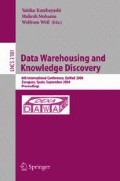Abstract
As a side effect of unprecedented amount of digitization of data, classical retrieval tools found themselves unable to go further beyond the tip of the Iceberg. Data Mining in conjunction with the Formal Concept Analysis, is a clear promise to furnish adequate tools to do so and specially to be able to derive concise generic and easy understandable bases of “hidden” knowledge, that can be reliable in a decision making process. In this paper, we propose to revisit the notion of association rule redundancy and to present sound inference axioms for deriving all association rules from generic bases of association rules.
Access this chapter
Tax calculation will be finalised at checkout
Purchases are for personal use only
Preview
Unable to display preview. Download preview PDF.
References
Agrawal, R., Skirant, R.: Fast algorithms for mining association rules. In: Proceedings of the 20th International Conference on Very Large Databases, pp. 478–499 (1994)
Brin, S., Motwani, R., Ullman, J.: Dynamic itemset counting and implication rules. In: Proceedings ACM SIGMOD, International conference on Management of Data, Tucson, Arizona, USA, pp. 255–264 (1997)
Manilla, H., Toinoven, H., Verkamo, I.: Efficient algorithms for discovering association rules. In: AAAI Worshop on Knowledge Discovery in Databases, Seattle, Washington, USA), pp. 181–192 (1994)
Bastide, Y., Pasquier, N., Taouil, R., Lakhal, L., Stumme, G.: Mining minimal non-redundant association rules using frequent closed itemsets. In: Proceedings of the international Conference DOOD 2000. LNCS, pp. 972–986. Springer, Heidelberg (2000)
Stumme, G., Taouil, R., Bastide, Y., Pasquier, N., Lakhal, L.: Intelligent structuring and reducing of association rules with formal concept analysis. In: Baader, F., Brewka, G., Eiter, T. (eds.) KI 2001. LNCS (LNAI), vol. 2174, pp. 335–350. Springer, Heidelberg (2001)
Zaki, M.J.: Generating non-redundant association rules. In: Proceedings of the 6th ACM SIGKDD International Conference on Knowledge Discovery and Data Mining, Boston, MA, pp. 34–43 (2000)
Ganter, B., Wille, R.: Formal Concept Analysis. Springer, Heidelberg (1999)
BenYahia, S., Cherif, C.L., Mineau, G., Jaoua, A.: Découverte des règles associatives non redondantes: application aux corpus textuels. In: Revue d’Intelligence Artificielle (special issue of Intl. Conference of Journées francophones d’Extraction et Gestion des Connaissances(EGC 2003), Lyon, France, vol. 17, pp. 131–143 (2003)
BenYahia, S., Nguifo, E.M.: A survey of Galois connection semantics-based approaches for mining association rules. Technical report, IUT-Lens, Centre de Recherche en Informatique de Lens (CRIL), Lens, France (2004)
BenYahia, S., Nguifo, E.M.: Contextual generic association rules visualization using hierarchical fuzzy meta-rules. In: Proceedings of the IEEE Intl. conference on Fuzzy Systems FUZZ-IEEE 2004, Budapest, Hungary (2004) (to appear)
Shneiderman, B.: The eyes have it: A task by data type taxonomy for information visualization. In: Press, I.C.S. (ed.) Proceedings IEEE Symposium on Visual Languages, Boulder, Colorado, pp. 336–343 (1996)
Barbut, M., Monjardet, B.: Ordre et classification. Algèbre et Combinatoire. Hachette, Tome II (1970)
Pasquier, N.: Data Mining: algorithmes d’extraction et de réduction des règles d’association dans les bases de données. Doctorat d’université, Université de Clermont-Ferrand II, France (2000)
Guigues, J., Duquenne, V.: Familles minimales d’implications informatives résultant d’un tableau de données binaires. Mathématiques et Sciences Humaines, 5–18 (1986)
Luxenburger, M.: Implication partielles dans un contexte. Mathématiques et Sciences Humaines 29, 35–55 (1991)
Luong, V.P.: Raisonnement sur les règles d’association. In: Proceedings 17ème Journées Bases de Données Avancées BDA 2001, Agadir (Maroc),Cépaduès Edition, pp. 299–310 (2001)
Kryszkiewicz, M.: Concise representations of association rules. In: Hand, D.J., Adams, N.M., Bolton, R.J. (eds.) Pattern Detection and Discovery. LNCS (LNAI), vol. 2447, pp. 92–109. Springer, Heidelberg (2002)
Author information
Authors and Affiliations
Editor information
Editors and Affiliations
Rights and permissions
Copyright information
© 2004 Springer-Verlag Berlin Heidelberg
About this paper
Cite this paper
Yahia, S.B., Nguifo, E.M. (2004). Revisiting Generic Bases of Association Rules. In: Kambayashi, Y., Mohania, M., Wöß, W. (eds) Data Warehousing and Knowledge Discovery. DaWaK 2004. Lecture Notes in Computer Science, vol 3181. Springer, Berlin, Heidelberg. https://doi.org/10.1007/978-3-540-30076-2_6
Download citation
DOI: https://doi.org/10.1007/978-3-540-30076-2_6
Publisher Name: Springer, Berlin, Heidelberg
Print ISBN: 978-3-540-22937-7
Online ISBN: 978-3-540-30076-2
eBook Packages: Springer Book Archive

